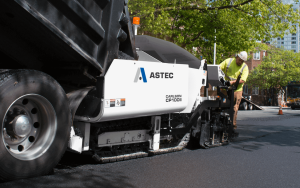How to Choose an Asphalt Paver
 Whether you’re buying a new or used asphalt paver, you want the best value for your money. So your ultimate consideration is total cost of ownership. The longer your asphalt paver lasts and the less it costs you in down time or maintenance, the faster it will earn back its original cost and continue to generate income.
Whether you’re buying a new or used asphalt paver, you want the best value for your money. So your ultimate consideration is total cost of ownership. The longer your asphalt paver lasts and the less it costs you in down time or maintenance, the faster it will earn back its original cost and continue to generate income.
Size matters.
Choosing the right size asphalt paver will help you get the greatest productivity with lowest operating cost. Key factors are:
- Overall job size and configuration.
- The materials you’ll be placing, such as cement-and-lime-stabilized sub-base, graded aggregate or bituminous, binder or surface course base.
- Paving width.
- Paving speed.
Compact machines have an 8-foot screed — great for parking lots and narrow areas such as driveways or shoulders. They typically run 3-20 horsepower and are rated between 100 and 400 tph. That’s tons per hour, the number that defines what you can accomplish. The screed is often mounted on the front of smaller models, to improve handling and control. If the unit isn’t self-propelled, you can tow it behind a tractor or dump truck.
Larger, highway-class asphalt pavers incorporate a tractor that drives, steers and distributes the asphalt and tows the screed, which shapes and levels material for the rolling machine. They typically run 100-250 horsepower, with ratings from 300 to 750 tph. Screeds can run 10-40-feet wide.
Look for features that assure top performance and quality.
 A heating and mixing system that ensures proper blend and temperature.
A heating and mixing system that ensures proper blend and temperature.- A feeder system that provides efficient material distribution with minimal segregation and handwork.
- Variable screed width, with choice of front or rear extender.
- Options for auger and conveyor systems and automatic conveyor tensioning.
- Self-diagnostics, for more efficient maintenance.
- Safety features such as a ventilation system that extracts fumes from the conveyor tunnel and auger chamber, directing them away from the operator.
- Operator comfort and convenience details that increase productivity.
- Warranty, whether the paver is new or used.
- Support, from a top-rated dealership.
Propulsion and mobility are key.
Asphalt pavers can operate on tracks or tires. There are pros and cons to each type, but if you’re doing a variety of paving jobs – or you want to expand your repertoire – you may well want both.
Smaller track pavers are good for confined areas because they can turn within their own footprint. Tracks are usually made of rubber now, because rubber moves faster than steel and technology advances have significantly improved rubber quality.
Rubber offers a more comfortable ride for the operator, and it provides the greatest flotation, particularly important if there’s a soft sub-base where wheels might sink. Better flotation also ensures greater stability and makes it easier to achieve a uniform surface. Tracks have better traction on steep terrain. Since they have more moving parts, maintenance and operating costs are higher. The complex undercarriage can increase initial price, and tracks can be costly to replace.
Tires are good for jobs that don’t require so much traction or flotation, such as overlaying on an existing surface. They cost less, have lower maintenance and operating costs, and they’re faster to drive between jobs without having to haul the paver on a trailer. A front-wheel-assist feature can boost power on hills, but pavers with tires can still be underpowered to pull a wider screed.
Choosing the right size asphalt paver, with top-quality performance features and low operating and maintenance costs, allows your crew to accomplish more in a day. That makes the job more profitable and allows you to move on to the next job sooner.
Visit Tracey Road Equipment today to request more information on any of your asphalt paving needs. We have a trained sales team available to help with any of your construction and road building demands.

I also appreciated the breakdown of the different types of pavers, from wheeled to tracked, and the explanation of their respective advantages and disadvantages. This information makes it easier to make an informed decision based on the specific needs of the project and the terrain it will be used on.
Thanks for the reminder that I should also look for a warranty when planning to hire an asphalt company. I’d like to know more about that kind of paving service because I want to get the landscaping of my home redone. I think that driveway will also require some work in order to make it look a lot prettier to look at.